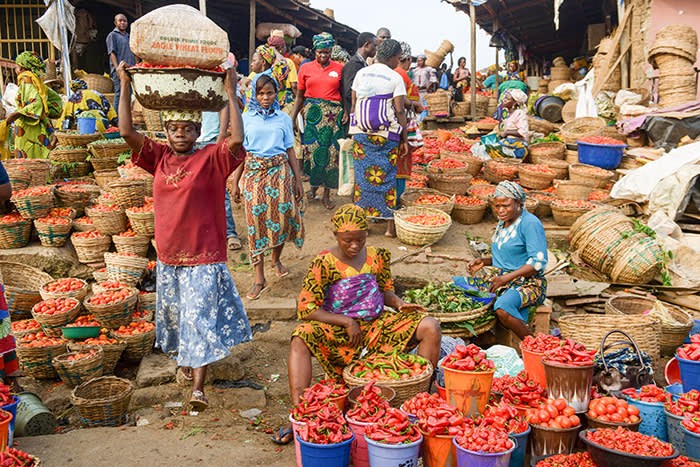
A Nigerian food market... Photo: File
The prices of major foodstuffs and other essential goods have started rising in response to the hike in the pump price of petrol, following the announcement by President Bola Tinubu that the era of subsidy on the product is gone.
Tinubu had on Monday during his inaugural speech at the Eagle Square in Abuja said the era of subsidy payment on fuel had ended, adding that with the 2023 budget making no provision for it, further subsidy payment was no longer justifiable.
He added that his administration would instead channel funds into infrastructure and other areas to strengthen the economy.
The presidential pronouncement led to an instant resurgence of fuel queues across the country with Nigerians foraging for the premium product. Though Tinubu’s decision received the backing of the NNPCL and the House of Representatives, it has since been resisted by the NLC and the Trade Union Congress of Nigeria.
According to the organised labour, the President cannot unilaterally take a decision on subsidy removal.
Currently, petrol sells for between N495 and N600 per litre across the nation from N185 to N220 until Monday.
A survey conducted by The Punch in various states of the federation on Saturday showed that apart from the increase in transport fares, the prices of foodstuffs, soup ingredients, daily provisions and other essential goods had started rising with expectations of further increment as manufacturers and retailers adjust to the new fuel regime.
In Lagos, the prices of foodstuffs like rice, yam, beans, garri, plantain, yam flour, semovita, corn, frozen chicken, turkey and palm oil have increased with traders anticipating further rise in the days ahead, even as families have started making panicky purchases to stock their homes with foodstuffs ahead of the strike called by the Nigeria Labour Congress for Wednesday to protest the soaring pump price of petrol.
A shop owner at Jakande Market in Lekki, identified only as Madam Linda, said there had been more traffic than usual to her shop by families trying to buy up the available food items in anticipation of further rise in prices and because of the planned strike by the organised labour.
Although the woman, who sells bags of rice, beans, vegetable oil and palm oil, among others, said the prices of foodstuffs had only increased marginally, she predicted that in the coming week, there might be a further surge in prices.
She said, “Many of my customers have said they want to stock their houses with enough foodstuffs because they don’t know what else to expect due to the increase in transport fares.
“It’s also the first Saturday since the month of May ended, so people have enough cash to buy plenty of foodstuffs now before prices go up significantly.”
Linda still sells her old stock of rice for N37,000 per bag, but said when the new stock arrives in the coming week, a bag of rice would likely sell for between N40,000 and N43,000.
But another rice seller, Favour Obiora, was already selling a bag for N45,000, explaining that the increase in price was as a result of the rise in transport fares since subsidy on fuel was removed.
“As of two weeks ago, a bag of rice was still selling for N38,000, but now I am selling N45,000 because of the transport charges by suppliers. The cost of transportation has almost doubled; so, we have to increase our prices in order to make profits as well,” she said.
A yam seller, Ibrahim Musa, sold a tuber of yam for N3,000 as against N2,000 before the subsidy removal, attributing the increase in price to not only transport fares, but the seasonal scarcity of old yams as well.
Musa said, “It’s old yam that is available now; the new yam has not come out. It is the same thing for plantain. It isn’t the season; so they are more costly than before.
“But the increase in transport fare is also a factor, but it is majorly because yam and plantain are not in season now.”
The Punch, however, gathered that a 25-litre keg of vegetable oil was selling for N38,000 instead of N34,000, while a bunch of plantain was selling between N6,000 and N8,000 same as it was before the fuel subsidy removal.
In the Ojodu area of the Ikeja Local Government area of Lagos State, prices of food items recorded a slight increment on Saturday.
A foodstuffs trader, who identified himself simply as Ikechukwu, noted that there had been a slight increment in the prices of some of the items and the prices could possibly go higher in the coming days.
He said, “We sell 10kg of semolina now for N6,800 to N7,000 instead of less than N6,000 a week ago. Also, a bag of the short grain rice goes for N34,000 and the long grain rice goes for N39,000 as against N32,000 and N37,000, respectively before now.”
In Ogun State, a trader at the Magboro Market, Mrs Ola Ajiboye, said, “Before Tinubu was inaugurated, a bag of rice was N30,000 , now it is N33,500. The price of one bag of beans was between N40,000 and N45,000, but it is now N55,000. Also, I used to buy a bag of garri for N14,000 or N15,000, but now it is N20,000. However, a 30-litre keg of palm oil was N27,000, but it has now come down to N25,000.”
“There is no panic-buying by customers because there is no money and they spent their disposable income on other things, which have also increased in prices due to the subsidy removal. Since the NLC is planning to go on strike next week, I see it affecting the prices of food items too,” a trader, Daniel Chukwu, said.
A palm oil dealer, Mrs Grace Abiodun, said the cost of transportation due to the fuel subsidy removal was the reason for the high cost of most foodstuffs in the state.
In Arepo, it was gathered that semolina, which was previously sold for N6,800 a bag had increased to N7,000, while the 1kg rose from N600 to N750, while a carton containing 20 pieces of spaghetti was currently selling for N9,500, reflecting an increase of N1,500 from the previous price.
A trader, Idayat Akanji, said some of the distributors had informed the retailers that the prices would be reviewed further by next week.
Another trader, Mrs Fatima Ogunbayo, stated, “Before, a four-litre tin of garri sold for N800, but now it is N1,000 toN1,100 because we now buy a bag for N20,000 instead of N17,000.
“The same measurement of yam flour was N1,500, but it is now N1,700, while that of corn was N1,200, but it is now N1,400.”
Visits to some markets such as Lafenwa, Omida, Kuto and Panseke in Abeokuta on Saturday revealed that the prices of garri, beans and rice had increased by at least five per cent.
According to a foodstuffs seller at the Panseke Market, Ramota Aleji, a bag of rice previously sold for N30,000, but it is now N31,500, while a bag of beans now sells for between N32,000 and N45,000 instead of N31,000 and N43,000 previously.
A trader at the Lafenwa Market, Kujenya Adebisi, said garri was now N21,000 for a bag as against the initial price of N19,000.
A food vendor, who spoke on condition of anonymity, said the increase in foodstuffs prices had affected the portion of food she dishes out to customers, adding that some foodstuff sellers who had the items in stock before the increase in petrol price, raised the prices without considering the people.
“We have reduced the portions of our serving as well as the ingredients. As you know, we don’t sell soup and all the expenses are only on the other items that we can sell like eba, semovita, rice, etc,” she said.











